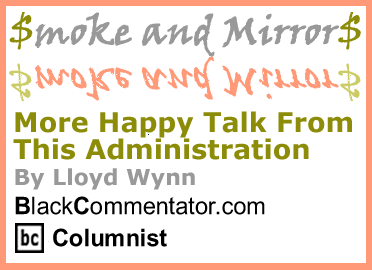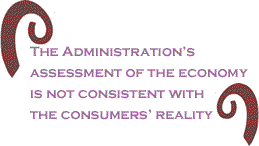
|
||||||||||||||||||||||
 |
||||||||||||||||||||||
 |
||||||||||||||||||||||
 |
||||||||||||||||||||||
 |
||||||||||||||||||||||
 |
||||||||||||||||||||||
 |
| The current issue is always free to everyone |
|
|
 |
A soft labor market is truly
a mischaracterization of the conditions which exists. The world's
biggest banks and securities firms cut 83,000 jobs from their
payroll since August of last year as June, 2008 was the worst June in the stock market since June, 1930. The upheaval is almost beyond comprehension. But not to worry, the Administration will find a way to spin this and convince you there are a few hiccups in the economy. Contrary to what others are saying, our reality points to disaster. The Dow was very close to growing claws the last week of June. Wall Street analysts agree many of the earnings estimates are too optimistic and must reflect what is occurring in the marketplace, signaling a rocky third and fourth quarter in 2008. Other investments in the stock market such as pension funds have been exposed to the downside risks of the equities and now imperil millions of Americans’ retirement income. Additionally, the financial sector is beyond what Federal Reserve Chairman Ben Bernanke described as considerable stress. One large investment bank is toast, one has write downs and loan related losses in excess of $40 billion and another is taking a standing eight count. Regardless of the stress test, the system is broken.
The futures market is experiencing its bubble now and increased investor
activity has attracted a bevy of speculators, sending commodity
prices skyrocketing. When consumers go to the service stations,
supermarkets, restaurants, dentists, dry-cleaners, etc. they
have an intimate experience with inflation. The Administration’s
assessment of the economy is not consistent with the consumers’
reality. Automobile owners are trading in pickups and Mercedes
for Saturns, not only because of the dramatic rise in gas prices
but a number of auto loan borrowers cannot continue to make
the higher auto payment and household expenses. Quick reference;
the Our
existence is almost surreal. We are experiencing true Reaganomics,
on full display. Reagan’s domestic agenda of repealing the New
Deal unleashed into the marketplace another cabal of financial
wizards attached to computer models. Deregulation of interest
rates, financial products, and a change in the tax code under
Reagan’s Administration opened the door to the sub-prime debacle.
Recent information indicates that overall economic activity continues to expand, partly reflecting some firming in household spending. However, labor markets have softened further and financial markets remain under considerable stress. Tight credit conditions, the ongoing housing contraction, and the rise in energy prices are likely to weigh on economic growth over the next few quarters (June 25, 2008, as reported by Bloomberg News).
The
next issue of what to do under the conditions we face, is slightly
more complex and requires skill, tenacity and patience. Blacks
who learned from experience and history are aware “when Whites
get the sniffles, Blacks get pneumonia” and White folk have
the flu right now. So what should we do? BlackCommentator.com Columnist, Lloyd Wynn, was a consultant in the secondary market. Lloyd is the author of Residential Real Estate Finance: From Application Through Settlement. Click here to contact Lloyd Wynn. |
Any BlackCommentator.com article may be re-printed so long as it is re-printed in its entirety and full credit given to the author and www.BlackCommentator.com. If the re-print is on the Internet we additionally request a link back to the original piece on our Website. Your comments are always welcome. eMail
re-print notice
If you send us an eMail message we may publish all or part of it, unless you tell us it is not for publication. You may also request that we withhold your name. Thank you very much for your readership. |
|
| July
3, 2008 Issue 284 |
|
| Executive Editor: Bill Fletcher, Jr. |
| Managing
Editor: |
| Publisher: Peter Gamble |
| Est. April 5, 2002 |
| Printer Friendly Version in resizeable plain text format or pdf format. |
 |
 |
 |
| |
| |























 On
the subject of financials, the sub-prime crisis has not abated.
Before we discuss the demise of the sub-prime industry let us
make a mental note, there were many educated consumers and upstanding
businesses who appreciated a legitimate financing option. The
face of sub-prime lenders today is illustrated in the foreclosures
that have added to a bulging housing supply, putting downward
pressure on home values. Joining the default list will be prime
mortgages. These loans are typically rated higher within the
security and when they default, most, if not all, investors
in that instrument will lose their investment and those losses
are passed on to the bond insurers - triggering lowered ratings.
The cycle repeats itself across multiple asset classes. Analysts
forecast, given the range of assets being pulled into the cycle,
sustained foreclosure activity through 2010. When combined with
tepid demand and diminished financing options, the trio will
not likely reduce a growing supply of homes on the market, further
eroding equity for many Americans.
On
the subject of financials, the sub-prime crisis has not abated.
Before we discuss the demise of the sub-prime industry let us
make a mental note, there were many educated consumers and upstanding
businesses who appreciated a legitimate financing option. The
face of sub-prime lenders today is illustrated in the foreclosures
that have added to a bulging housing supply, putting downward
pressure on home values. Joining the default list will be prime
mortgages. These loans are typically rated higher within the
security and when they default, most, if not all, investors
in that instrument will lose their investment and those losses
are passed on to the bond insurers - triggering lowered ratings.
The cycle repeats itself across multiple asset classes. Analysts
forecast, given the range of assets being pulled into the cycle,
sustained foreclosure activity through 2010. When combined with
tepid demand and diminished financing options, the trio will
not likely reduce a growing supply of homes on the market, further
eroding equity for many Americans.
 I
will conclude by briefly discussing the Congressional response
to the above conditions and what one can do under these conditions.
Not very much has happened substantively except passage of the
stimulus package. The foreclosure rescue bill Congress has been
debating likely will not be signed by the President before the
fourth quarter and implemented in 2009. I am opposed to most
any iteration of the bill Congress passes that overlooks the
reasonable assumption that home values will continue to decline
over the next two years. Anything less, potentially exposes
families rescued by the bill to hardship and foreclosure again
if home values continue to decline.
I
will conclude by briefly discussing the Congressional response
to the above conditions and what one can do under these conditions.
Not very much has happened substantively except passage of the
stimulus package. The foreclosure rescue bill Congress has been
debating likely will not be signed by the President before the
fourth quarter and implemented in 2009. I am opposed to most
any iteration of the bill Congress passes that overlooks the
reasonable assumption that home values will continue to decline
over the next two years. Anything less, potentially exposes
families rescued by the bill to hardship and foreclosure again
if home values continue to decline.







